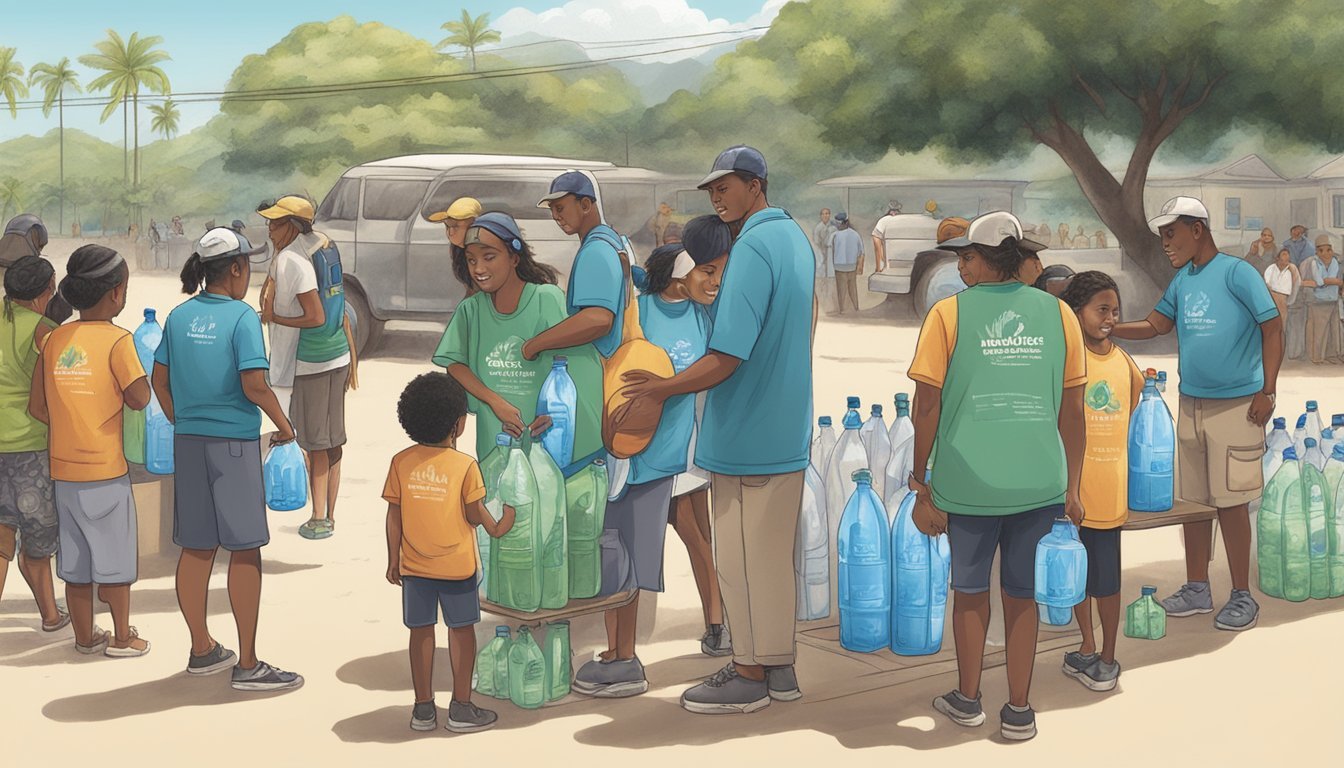Is Waiakea the Best Bottled Water?
Sustainable Hawaiian Volcanic Hydration
Waiakea bottled water stands out in the crowded beverage market with its unique origin and commitment to sustainability. Sourced from the eastern base of Hawaii's Mauna Loa volcano, this naturally alkaline water undergoes a remarkable journey through porous volcanic rock. Waiakea's water is naturally enriched with minerals and electrolytes, offering potential health benefits to consumers.
The company's dedication to environmental responsibility is evident in its packaging choices. Waiakea uses BPA-free bottles made from 100% post-consumer recycled materials, giving new life to discarded plastics. This approach aligns with growing consumer demand for more sustainable product options.
Beyond its environmental initiatives, Waiakea also focuses on social impact. For every liter of water purchased, the company donates a week's worth of clean water to communities in need. This ethical business model combines hydration with humanitarian efforts, allowing customers to make a positive difference with each bottle they buy.
Origin and Natural Filtration
Waiakea water originates from a pristine source on Hawaii's Big Island. Its journey through volcanic rock imbues it with minerals and purity.
Mauna Loa Volcano as Source
Waiakea water begins its journey at the snow-capped peak of Mauna Loa volcano. This massive shield volcano on Hawaii's Big Island rises 13,681 feet above sea level. Mauna Loa's summit receives abundant rainfall and snowmelt.
The volcano's porous structure allows water to seep into its interior. This natural reservoir supplies Waiakea's water source. The volcanic environment provides a unique starting point for the water's mineral-rich composition.
Process of Water Flow Through Porous Volcanic Rock
As water travels down Mauna Loa, it undergoes a remarkable filtration process. The water flows through thousands of feet of porous volcanic rock. This natural filtration system takes advantage of the volcano's structure.
Lava tubes and interconnected pores in the rock act as a maze-like filter. The water moves slowly through this volcanic terrain. This journey can take up to 30 days from start to finish.
During its passage, the water picks up beneficial minerals. It also leaves behind potential contaminants.
Purity and Mineral Composition
The volcanic filtration process results in naturally pure water. It also enriches Waiakea water with essential minerals and electrolytes.
Key minerals found in Waiakea water include:
Silica
Calcium
Magnesium
Sodium
Potassium
These minerals contribute to Waiakea's slightly alkaline pH, which ranges from 7.6 to 8.2. The mineral content gives the water a smooth taste and potential health benefits.
The porous volcanic rock acts as a natural filter. It removes impurities while allowing beneficial minerals to dissolve into the water. This process creates a unique mineral profile distinct to Waiakea's Hawaiian volcanic source.
Health and Nutritional Benefits
Waiakea bottled water offers several health and nutritional advantages due to its unique composition and natural filtration process. Its alkaline pH and mineral content contribute to potential wellness benefits for consumers.
Alkalinity and pH Level
Waiakea water boasts a naturally alkaline pH level of 8.8. This high alkalinity may help neutralize excess acid in the body. Some studies suggest that alkaline water consumption could reduce symptoms of acid reflux. The water's pH level exceeds that of many other bottled waters, which typically range from 5 to 7 on the pH scale.
Drinking alkaline water might support the body's natural pH balance. This balance is crucial for various bodily functions. While more research is needed, some proponents claim alkaline water may boost hydration and energy levels.
Essential Minerals and Electrolytes
Waiakea water contains a blend of naturally occurring minerals and electrolytes. These include:
Magnesium
Calcium
Potassium
Silica
These minerals play vital roles in bodily functions. Magnesium supports muscle and nerve function. Calcium is essential for strong bones and teeth. Potassium helps regulate fluid balance and muscle contractions.
Silica, found in higher concentrations in Waiakea water, may support skin, hair, and nail health. The natural filtration through volcanic rock enriches the water with these beneficial elements.
Comparison with Other Alkaline Water Brands
Waiakea water stands out among alkaline water brands due to its natural sourcing and filtration process. Unlike some competitors that artificially alkalize their water, Waiakea's alkalinity comes from its volcanic source.
Compared to Essentia, which has a pH of 9.5, Waiakea's 8.8 pH is closer to the body's natural levels. Fiji Water, another popular brand, has a lower pH of 7.7. Waiakea's mineral content is generally higher than many standard bottled waters.
The volcanic filtration process of Waiakea water sets it apart from brands using reverse osmosis or other artificial filtration methods. This natural process preserves beneficial minerals while removing impurities.
Sustainability and Environmental Impact
Waiakea bottled water stands out for its commitment to sustainable practices and positive environmental impact. The company prioritizes eco-friendly sourcing, production, and packaging methods to minimize its ecological footprint.
Sustainable Sourcing at the Hawaiian Aquifers
Waiakea sources its water from pristine Hawaiian aquifers, ensuring minimal environmental disruption. These aquifers are naturally replenished by rainfall filtering through porous volcanic rock.
The company carefully monitors water extraction rates to maintain the aquifers' long-term health. This sustainable approach helps preserve Hawaii's unique ecosystem.
Waiakea's source is located in one of the purest environments on Earth, surrounded by bio-diverse forest preserves. This location contributes to the water's natural purity and mineral content.
Ethical Production and Contribution to Environmental Causes
Waiakea employs ethical production practices throughout its operations. The company focuses on reducing waste and energy consumption in its bottling process.
A portion of Waiakea's profits goes towards environmental conservation efforts. These initiatives include reforestation projects and clean water access programs in Africa.
Waiakea partners with local organizations to support community-based environmental projects. This approach helps create positive change beyond just sustainable water production.
Certified CarbonNeutral and RPET Bottles
Waiakea has achieved certified CarbonNeutral status, meaning it offsets all carbon emissions from its operations. This certification reflects the company's commitment to combating climate change.
The company uses high-grade 100% RPET (recycled polyethylene terephthalate) for its bottles. RPET production uses:
85% less energy
90% less water
Reduces carbon emissions by 90%
Waiakea's bottles are BPA-free and fully recyclable. The company is also developing Oceanplast™, a degradable plastic alternative to further reduce environmental impact.
Product Range and Availability
Waiakea offers a variety of bottled water options to meet different consumer needs. The brand focuses on sustainable packaging and wide distribution to make its Hawaiian volcanic water accessible.
Sizes and Packaging Options
Waiakea water comes in several bottle sizes. The most common are 500ml and 1 liter bottles, ideal for individual consumption. For larger quantities, Waiakea provides 10L and 15L box options called Pahu Nunui.
All Waiakea bottles are made from 100% RPET (recycled polyethylene terephthalate). This material is BPA-free and helps reduce environmental impact. The bottles are designed to be lightweight yet durable.
Waiakea's commitment to sustainability extends to its packaging. The brand uses eco-friendly materials and minimalist designs to reduce waste.
Distribution and Retail Partners
Waiakea water is available through various retail channels. Major grocery chains like Whole Foods Market stock Waiakea products. Health food stores and specialty beverage shops also carry the brand.
Many convenience stores and gas stations offer Waiakea as a premium bottled water option. The brand has expanded its presence in hotels and restaurants, catering to the hospitality industry.
Waiakea has distribution partnerships that enable wide availability across the United States. International expansion has brought Waiakea to select markets overseas.
Online Purchase and Shipping Information
Customers can buy Waiakea water directly from the brand's official website. The online store offers individual bottles, multipacks, and subscription options for regular deliveries.
Waiakea provides free shipping on orders over a certain value. Standard shipping typically takes 3-5 business days within the continental US. Expedited options are available for faster delivery.
The brand ships to all 50 states and select international locations. Waiakea's website features a user-friendly interface for easy ordering and account management. Customers can track their shipments and manage subscriptions online.
Consumer Information
Waiakea bottled water offers consumers a unique product with distinctive characteristics. Customers can evaluate its taste, quality, and value compared to other options on the market.
Taste Profile and Water Quality Reports
Waiakea water originates from an artesian aquifer near Hilo, HI. The water passes through volcanic rock, which contributes to its mineral content and slight alkalinity. This natural filtration process results in a smooth, clean taste that many consumers find refreshing.
Water quality reports indicate that Waiakea meets or exceeds all federal and state standards for drinking water. The company regularly tests for contaminants and publishes the results for transparency.
Independent tests have shown a Total Dissolved Solids (TDS) level of 53 ppm and a pH of approximately 7.5, placing it in the neutral to slightly alkaline range.
Cost Comparison with Similar Products
Waiakea water is positioned as a premium product, which is reflected in its pricing. A typical case of Waiakea water costs around $9.98, though prices may vary by retailer and location.
This price point places Waiakea in the upper range compared to standard bottled water brands. However, it is generally competitive with other premium and artesian water products.
Factors contributing to the higher cost include:
Sourcing from a single, remote location
Sustainable packaging initiatives
Marketing as a premium, volcanic water
Customer Reviews and Ratings
Customer feedback for Waiakea water is generally positive. Many reviewers praise its taste and perceived purity. The brand's eco-friendly initiatives also receive favorable mentions.
Common positive points in reviews include:
Clean, crisp taste
Smooth texture
Perceived health benefits from mineral content
Some customers express concerns about the higher price point compared to regular bottled water. A few negative reviews mention issues with packaging or delivery, though these appear to be isolated incidents.
Overall satisfaction ratings tend to be high, with many customers indicating they would purchase again despite the premium cost.
Community and Charitable Initiatives
Waiakea Water demonstrates a strong commitment to social responsibility through various philanthropic programs. The company focuses on providing clean water access, supporting education, and partnering with non-profit organizations to create positive change in communities.
Partnerships with Non-Profit Organizations
Waiakea collaborates with Pump Aid, a non-profit organization dedicated to addressing water poverty and food insecurity in Malawi, Africa. This partnership aims to provide sustainable clean water solutions to communities in need. For every case of Waiakea water purchased, the company donates one month of clean water to individuals in Malawi.
The initiative has made a significant impact, improving access to safe drinking water for thousands of people. Pump Aid's approach focuses on long-term solutions, ensuring that communities can maintain their water sources independently.
Access to Clean Water Programs
Waiakea's clean water programs extend beyond Africa. The company's Kokua Initiative, funded through a percentage of bottled water sales, supports various water-related projects. These efforts include improving water infrastructure in underserved areas and promoting water conservation practices.
The initiative also educates communities about sustainable water usage and the importance of clean water for health and well-being. Waiakea's commitment to providing access to clean water aligns with its core values of sustainability and social responsibility.
Education and Local Community Support
Waiakea's community engagement extends to educational initiatives and local support programs. The company offers scholarships and internship opportunities to students interested in environmental studies and sustainability. These programs aim to foster the next generation of environmental stewards.
In Hawaii, Waiakea supports ʻāina-based conservation efforts, which focus on preserving the natural environment and traditional land management practices. The company also provides assistance to vulnerable community members through various outreach programs.
Waiakea's educational initiatives include workshops on sustainable water management and environmental conservation. These programs help raise awareness about pressing environmental issues and empower communities to take action.






